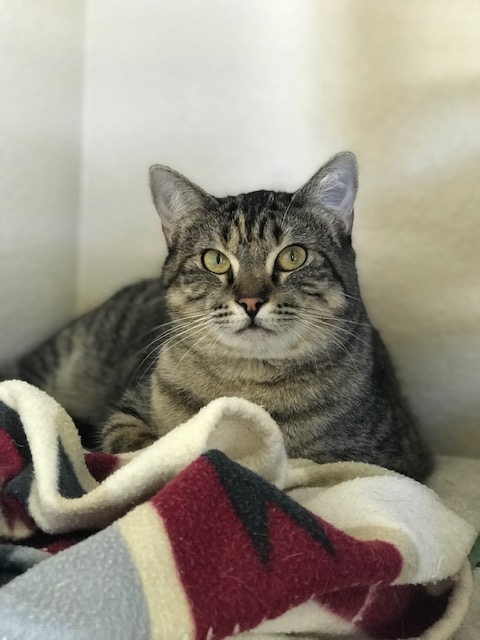
24 Mar Second Chance: The Cat Doctor is In!
Second Chance Humane Society’s Animal Resource Center and Thrift Shops have been serving San Miguel, Ouray & Montrose Counties for 27 years. Call 626-2273 to report a lost pet, learn about adopting a homeless pet, or about our Emergency Response, Community Medical, Spay/Neuter, Volunteer, or other services. View shelter pets and services online: www.adoptmountainpets.org.
Go here for more Second Chance pets.

Scribbles
Just because dogs are used more as therapy animals doesn’t mean that cats, who are great relaxation and healing promoters, can’t do the work too. Just like other animals, therapy cats visit nursing homes, hospitals, courthouses, and schools. So keep us in mind when you are needing some therapeutic healing…
Shelter cats here at Second Chance still talk about Pickles the Cat.
Pickles was the first cat to participate in Second Chance’s Pet Power Program back in 2006. She would go with Second Chance volunteers to nursing homes in Montrose and purr in the arms of a volunteer as she was carried from room to room to visit with elderly residents. Even if a resident was lying in bed, a volunteer could place Pickles on the bed and she would curl up with the resident until it was time to visit someone else.
Not once did she try to run or jump off the bed, she just kicked back and enjoyed. The light and love that would beam from the residents as they snuggled with Pickles was simply beautiful. She would remind some residents of former cats they had and reignite memories and connections that would linger long after Pickles left their room.
One resident who always perked up when Pickles entered the room would reach for a napkin on her bed stand that was wrapped around bacon, confiscated from breakfast as a little Pickles snack. Yep, Pickles and bacon…
While therapy cats do not have the specialized training of service animals, they do need to have proper training and socialization to ensure that the humans involved are safe. Many facilities require therapy animals to be certified by a therapy organization and covered by liability insurance. Two national groups that evaluate and certify cats and provide insurance coverage for therapy visits are Pet Partners (petpartners.org) and Love on a Leash (loveonaleash.org).
Your cat’s temperament is the most important determinant in whether you cat would enjoy interacting with new and different people and be comfortable with new experiences. Therapy cats need to be consistently friendly, calm, gentle, and patient.
If you think your pet is a good candidate for therapy animal work you can get started by acclimating your cat to being on harness and leash and to travel. You should also introduce your cat to a variety of situations and make sure he or she is comfortable with lots of touching.
You want to build a strong bond with your cat so they trust you during your adventures and so you can read your cat’s moods, reactions, and body language. Pay attention to these indicators along the way and never push you cat toward this work if they seem uncomfortable. Many cats are better suited to be you and your family’s personal therapy cat, and that is enough.
About me:
My name is Scribbles. I think I would be best as a family therapist, not a group therapist. Although I am a lovely, gentle girl kitty, I can be a bit shy with new people. I am under a year old, fairly independent, get along with other cats and love to explore as well as gaze out the window envisioning my new life with a forever family – who could use my therapeutic prowess…


Sorry, the comment form is closed at this time.